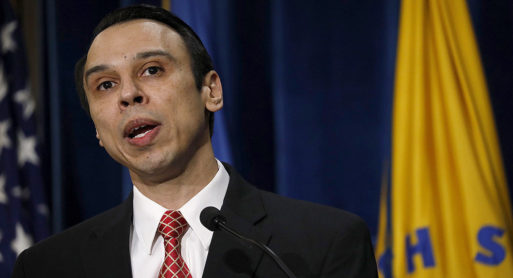In a significant blow to Americans who wish to exercise their right to die on their own terms, the Trump administration announced in January that it has created a new Conscience and Religious Freedom Division in the Department of Health and Human Services’ Office of Civil Rights. According to the official press release, the office was “established to restore federal enforcement of our nation’s laws that protect the fundamental and unalienable rights of conscience and religious freedom.”

Roger Severino heads the Office of Civil Rights at HHS
Credit:politico.com
The move threatens both reproductive freedoms and access to a variety of end-of-life options, including physician aid in dying, voluntarily stopping eating and drinking, and terminating life support when the possibility of meaningful recovery no longer exists.
The new division will not enact any laws. According to its website, it is tasked with enforcing anti-discrimination statutes that already exist. The majority of these pertain to women’s reproductive health, specifically the right of healthcare providers to refuse to provide contraception or perform abortions or sterilizations on religious or moral grounds. However, Section 1553 of the Affordable Care Act extends conscience protections to physicians and healthcare organizations that refuse to “provide any health care item or service furnished for the purpose of causing, or for the purpose of assisting in causing, the death of any individual, such as by assisted suicide, euthanasia, or mercy killing.” Any organization that is found guilty of discriminating against providers who opt out of these services can lose access to federal funds.
According to Compassion & Choices, the Conscience and Religious Freedom Division will offer the services of federal attorneys to providers who request representation in discrimination claims.
A Solution in Search of a Problem?
The creation of the OCR’s Conscience and Religious Freedom Division is consistent with the Trump administration’s willingness to acquiesce to the demands of the Religious Right. And it appears to fulfill his campaign promise to “vigorously uphold the rights of conscience and religious freedom” in the United States. But laws that protect healthcare providers who choose not to participate in procedures that run counter to their religious or moral beliefs have been in effect since 1996. And despite the claim from OCR director Roger Severino that “governments big and small have treated conscience claims with hostility instead of protection,” every state that permits medical aid in dying specifically and explicitly exempts any provider who chooses not to participate on moral grounds. Thus, the rights of providers are already well protected. Unfortunately, the rights of vulnerable, terminally ill people are far less secure.

Credit: wisbar.org
Even in states where medical aid in dying is legal, patient access is already curtailed due to the proliferation of healthcare organizations owned or operated by the Catholic Church. These providers adhere to the Ethical and Religious Directives for Catholic Health Care Services, a lengthy document that outlines prohibitions against a host of medical interventions, including assisting patients who wish to bring about their own death. And their numbers are growing. According to the ACLU, as of 2016, nearly 15 percent of all acute care hospitals in the United States comply with the Directives, an increase of 22 percent since 2001. (The ACLU is currently suing a number of Catholic healthcare providers for refusing to provide essential emergency services to women in need of care — a violation of federal law.)
A Disturbing Trend
This latest attempt by the executive branch to limit patient autonomy is part of a disturbing trend of politicizing the nation’s health. Last year, the House Committee on Oversight and Government Reform voted along party lines to block the District of Columbia’s Death with Dignity Act, a law that had the overwhelming support of D.C. residents and was approved by the D.C. City Council by a vote of 11-2 in November, 2016.
Fortunately, the resolution failed to reach the House floor or the Senate by the deadline of Feb. 17, 2017, so it never came up for a vote. However, the fact that the effort proceeded at all points to the continued determination of some legislators and the Trump administration to subvert the will of the American people, who consistently express support for death with dignity laws.
Obviously, the fight for death with dignity is far from over in the United States. Measures are moving forward in a number of states, including Alaska, New York, New Jersey and Kansas. But interference at the federal level may threaten implementation and make access more difficult for people who need information, access and compassionate care.
If you, like the people here at SevenPonds, support the right of every individual to make informed choices about their own lives and their own deaths, please let your legislators know how you feel.
And remind them that conscience and religious freedom are two way streets.

 Conscience and Religious Freedom Division Threatens Patient Autonomy
Conscience and Religious Freedom Division Threatens Patient Autonomy



 The Spiritual Symbolism of Cardinals
The Spiritual Symbolism of Cardinals
 Meaning-Focused Grief Therapy: Imaginal Dialogues with the Deceased
Meaning-Focused Grief Therapy: Imaginal Dialogues with the Deceased















Refusing to provide an abortion to a woman when her life is in danger and she cannot be transferred to another hospital in time is one thing. Yes, all hospitals, even Roman Catholic ones, should be required to perform an abortion in these rare cases. But taking a life, whether it’s called medical aid in dying, assisted suicide, or euthanasia as is quite common in the Netherlands and Belgium (sometimes without explicit patient consent) is something very different. No hospital, hospice, assisted living center, or nursing home should be compelled to allow these acts to be performed on their premises if they violate their religious or other ethical standards. Does every health care facility offer every surgery or medical procedure? No. Should they be required to do so? No. Nor should any health care professional be required to perform or refer patients to others who will perform them. Providing a brochure with information with information about obtaining referrals or a website address should be adequate. Would you force a health care professional to participate in the involuntarily sterilization of a developmentally disabled adult or turn away a patient from lifesaving medical care because he/she cannot afford it? If no, then why would you compel a health care professional to participate in something that is equally morally repugnant to him or her?
Report this comment
Hi Sue,
AS I pointed out in the post, a number of federal laws protect providers who choose not to provide abortion services, sterilization,or contraception. And Death with Dignity laws explicitly exempt any provider who chooses not to participate…the provider does not even need to claim a religious exemption or state a moral objection. They can simply say no. I did not say or even imply that these laws should be repealed. The post is about a new agency whose purpose appears to be to bar or at least diminish access to legally protected medical care, specifically aid in dying. As a person who has seen too many people who would prefer to die a dignified death at home receiving unwanted, expensive and ultimately futile medical care at the end of life this concerns me a great deal. Sorry if you misunderstood.
Report this comment